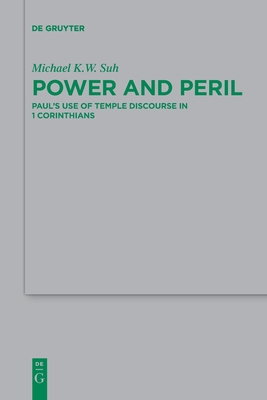Power and Peril: Paul's Use of Temple Discourse in 1 Corinthians

Power and Peril: Paul's Use of Temple Discourse in 1 Corinthians
This study probes the significance of Paul's statement in 1 Corinthians 3:16 announced to a group of believers in Corinth: Do you not know that you are the temple of God and that the spirit of God dwells among you? The question is framed in the Greek language such that Paul expected an affirmative response (i.e. 'Yes, we know we are the temple of God'), and yet mapping such an idea onto a gathering of people is rather unprecedented in antiquity. By surveying relevant literary texts and material culture from the ancient Mediterranean (roughly 400 BCE--200 CE), the author shows how Paul appropriated the concept of temple in his exhortation to the Corinthians. A few key texts in 1 Corinthians can be read as a cohesive and coherent set of passages that unpack the idea of the Corinthians as the temple of God. While these passages are not typically read together, this study shows how themes such as power and spirit, traditions from Exodus, divine benefits, and sacrificial foods found in these passages reflect similar concerns observed in temples and other sanctuaries in ancient Greek, Roman, and Jewish contexts. Careful analysis of the religious experience of visitors to temples--an important topic that remains largely ignored in secondary literature--gives greater clarity to the nuances of Paul's temple discourse. As the temple, the Corinthian community not only receives God's power and benefits, but also remains vulnerable to peril posed by insiders and outsiders.
PRP: 193.67 Lei
Acesta este Prețul Recomandat de Producător. Prețul de vânzare al produsului este afișat mai jos.
174.30Lei
174.30Lei
193.67 LeiIndisponibil
Descrierea produsului
This study probes the significance of Paul's statement in 1 Corinthians 3:16 announced to a group of believers in Corinth: Do you not know that you are the temple of God and that the spirit of God dwells among you? The question is framed in the Greek language such that Paul expected an affirmative response (i.e. 'Yes, we know we are the temple of God'), and yet mapping such an idea onto a gathering of people is rather unprecedented in antiquity. By surveying relevant literary texts and material culture from the ancient Mediterranean (roughly 400 BCE--200 CE), the author shows how Paul appropriated the concept of temple in his exhortation to the Corinthians. A few key texts in 1 Corinthians can be read as a cohesive and coherent set of passages that unpack the idea of the Corinthians as the temple of God. While these passages are not typically read together, this study shows how themes such as power and spirit, traditions from Exodus, divine benefits, and sacrificial foods found in these passages reflect similar concerns observed in temples and other sanctuaries in ancient Greek, Roman, and Jewish contexts. Careful analysis of the religious experience of visitors to temples--an important topic that remains largely ignored in secondary literature--gives greater clarity to the nuances of Paul's temple discourse. As the temple, the Corinthian community not only receives God's power and benefits, but also remains vulnerable to peril posed by insiders and outsiders.
Detaliile produsului











